
Today’s catechesis is dedicated to a central aspect of the subject of the family: that of the great gift that God made to humanity with the creation of man and woman and with the Sacrament of Marriage. This catechesis and the next are concerned with the difference and complementarity between man and woman, who are at the summit of the divine creation; the two following ones will be on Marriage.
We begin with a brief comment on the first account of Creation in the Book of Genesis. Here we read that God, after having created the universe and all living beings, created his masterpiece, namely, the human being, which he made in his own image: “in the image of God He created them; male and female he created them” (Genesis 1:27).
As we all know, sexual difference is present in so many forms of life, in the long scale of the living. However, only in man and in woman does it bear in itself the image and likeness of God: the biblical text repeats it a good three times in two verses (26-27): Man and woman are image and likeness of God! This tells us that not only man in himself is the image of God, not only woman in herself is the image of God, but also man and woman, as a couple, are the image of God. The difference between man and woman is not for opposition, or for subordination, but for communion and creation, always in the image and likeness of God.
Experience teaches it: to know himself well and to grow harmoniously, the human being is in need of reciprocity between man and woman. When this does not happen, the consequences are seen. We are made to listen to and to help one another. We can say that without the reciprocal enrichment in this relation – in thought and in action, in affections and in work, also in the faith – the two cannot understand in depth what it means to be a man and a woman.
Modern and contemporary culture has opened new areas, new freedoms and new depths for the enrichment of the understanding of this difference. However, it has also introduced many doubts and much skepticism. For instance, I wonder, for example, if the so-called gender theory is not also an expression of a frustration and of a resignation, which aims to cancel the sexual difference because it no longer knows how to address it. Yes, we risk taking a step backward. The removal of the difference, in fact, is the problem, not the solution. To resolve their problems of relation, man and woman must instead talk more to one another, listen more to one another, know one another more, love one another more. They must relate to one another with respect and cooperate with friendship. With these human bases, sustained by the grace of God, it is possible to plan the matrimonial and family union for the whole of life. The matrimonial and family bond is something serious, and it is for everyone, not only for believers. I would like to exhort the intellectuals not to abandon this topic, as if it had become secondary for the commitment in favor of a freer and more just society.
God has entrusted the earth to the alliance of man and of woman: its failure makes the world arid of affections and darkens the sky of hope. The signs are already worrying, and we see them. I would like to indicate, among many, two points that I believe must be attended with greater urgency.
The first. It is without doubt that we must do much more in favor of woman if we want to give back more strength to the reciprocity between men and women. In fact, it is necessary that women not only be more listened to, but that her voice has real weight, a recognized authoritativeness in the society and in the Church. The way itself with which Jesus considered women –we read it in the Gospel, it is so! — in a context less favorable than ours, because in those times women were in fact in second place … and Jesus considered her in a way which gives a powerful light, which enlightens a path that leads far, of which we have only followed a small piece. We have not yet understood in depth what things the feminine genius can give us, which woman can give to society and also to us. Perhaps to see things with other eyes that complements the thoughts of men. It is a path to follow with more creativity and more audacity.
A second reflection concerns the topic of man and woman created in the image of God. I wonder if the crisis of collective trust in God, which does us so much harm, and makes us become sick with resignation, incredulity and cynicism, is not also connected to the crisis of the alliance between man and woman. In fact the biblical account, with the great symbolic fresco on the earthly paradise and original sin, tells us in fact that the communion with God is reflected in the communion of the human couple and the loss of trust in the celestial Father generates division and conflict between man and woman.
From here comes the great responsibility of the Church, of all believers, and first of all of believing families, to rediscover the beauty of the creative design that inscribes the image of God also in the alliance between man and woman. The earth is filled with harmony and trust when the alliance between man and woman is lived well. And if man and woman seek it together between themselves and with God, without a doubt they will find it. Jesus encourages us explicitly to give witness to this beauty, which is the image of God. Thank you!
* * *
Speaker:
Dear Brothers and Sisters: Continuing our catechesis on the family, today we reflect on the complementarity between man and woman. Scripture tells us that “God created man in his own image… male and female he created them” (Gen 1:27). Man and woman bear the image and likeness of God not only as individuals, but also together. In God’s plan, sexual differentiation is not ordered to subordination, but to communion and procreation. This reciprocity brings harmony and enrichment to the human family. But it also presents a constant challenge; that men and women learn how to speak to one another, and to respect and love each other. Nowadays, we sense the responsibility to do more in favour of women, recognizing the weight and authority of their voices in society and the Church. We must also ask ourselves to what extent society’s loss of faith in God is related to the crisis of that covenant. The challenge faced by the Church, and by all believers and families, is to rediscover the beauty of God’s plan, the imprint of his image in the covenant between man and woman.
Pope Francis (in Italian):
I offer an affectionate greeting to all the English-speaking pilgrims and visitors present at today’s Audience, including those from England, Ireland, Denmark, Norway, China, Indonesia, Nigeria, Canada and the United States. Upon you and your families I invoke the peace and joy of the Risen Lord!
* * *
I give a cordial welcome to the Italian-speaking pilgrims. I am happy to receive the students of the Claretianum on the occasion of the Year for Consecrated Life and the Religious of the Most Holy Sacrament that observe the three hundred years of their Congregation: I exhort you to live the religious vocation always with the joy and enthusiasm of the disciples of the Risen Lord, always faithful to the charism of the foundation. I greet the Priests of Mercy, the School of <Non-Commissioned Officers> of Viterbo, the Reale Mutua Assicurazioni and the parish groups, in particular the faithful of Cervinara and Airola.
A particular thought goes to young people, the sick and newlyweds. In this Easter Season, I encourage you to be true witnesses of the Resurrection in your families and in your environments of life: dear young people, especially you students of the Saint Elizabeth School of Rome, remember that mercy is God’s most beautiful gift; dear sick, allow yourselves to be consoled by the Celestial Father; and you, dear newlyweds, live your love imitating the merciful love of Jesus.

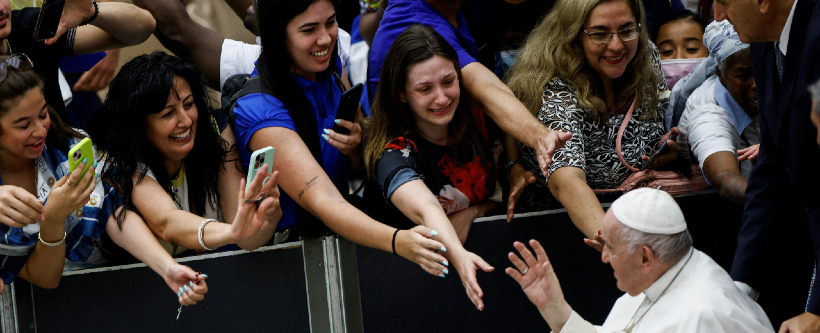
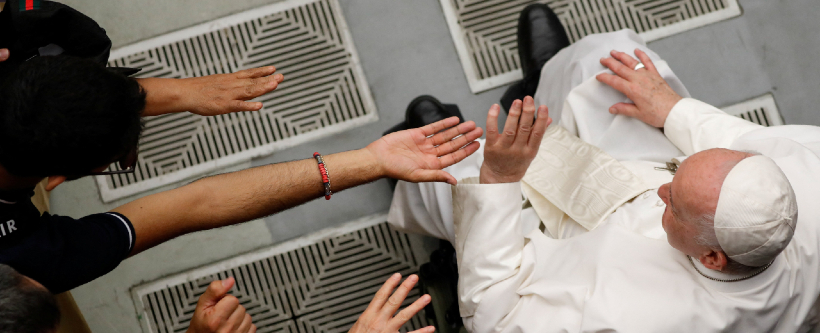
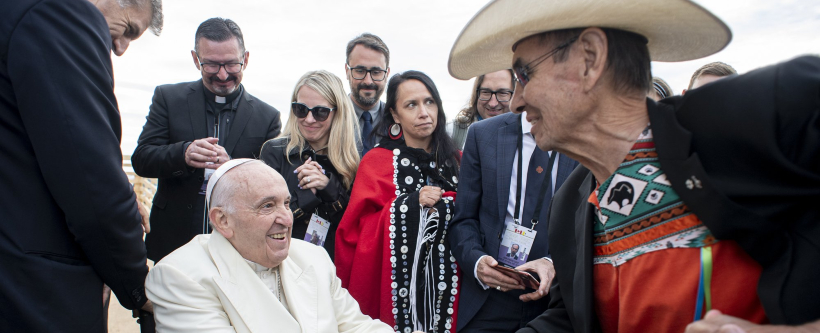
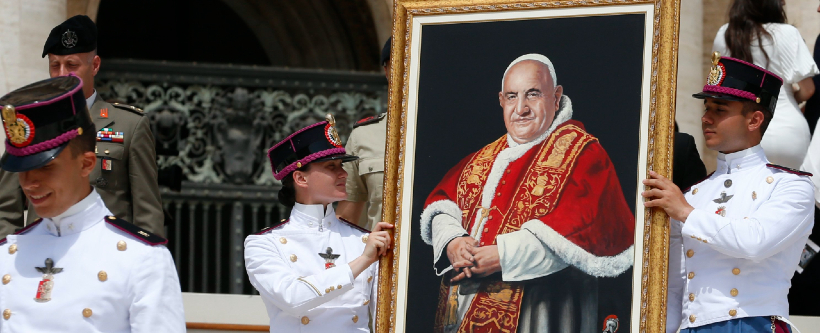
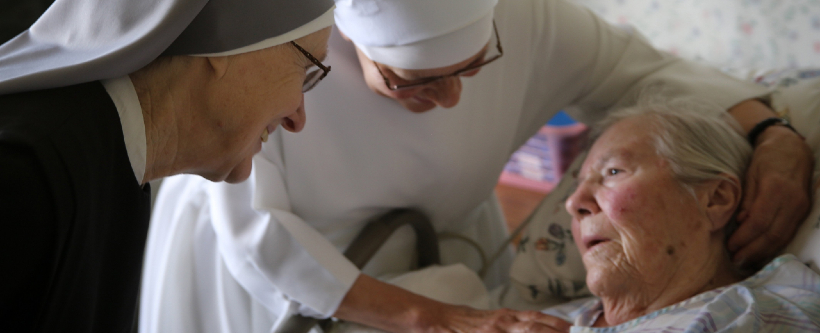
Facebook Comments